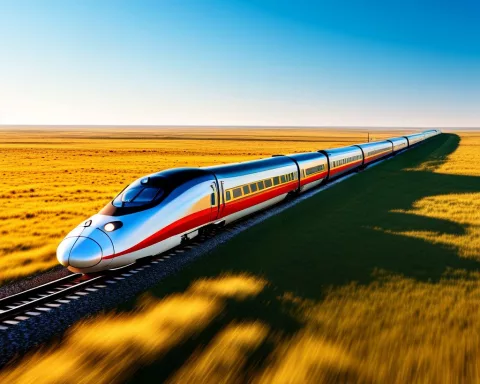Deputy President Paul Mashatile is leading the charge to improve South Africa’s infrastructure, focusing on better roads, energy, and communication systems. By encouraging private investment and overcoming red tape, he aims to boost the economy and enhance the lives of everyday people. Mashatile believes that strong infrastructure is key to growth and job creation, helping to connect communities and support local businesses. With ambitious plans ahead, he invites stakeholders to work together for a brighter, more sustainable future for all South Africans.
How is Deputy President Paul Mashatile influencing South Africa’s infrastructure development?
Deputy President Paul Mashatile is shaping South Africa’s infrastructure by advocating for strategic investments across transportation, energy, and telecommunications. His leadership focuses on enhancing project readiness, leveraging private sector participation, and addressing regulatory barriers to drive economic growth and improve citizens’ quality of life.
The Role of Infrastructure in Economic and Social Development
In today’s world, robust infrastructure is a cornerstone of economic progress, and Deputy President Shipokosa Paulus Mashatile is at the helm of South Africa’s ambitious agenda to revamp its infrastructure. Speaking at the Standard Bank Infrastructure Focus Engagement in London, Mashatile articulated a compelling vision of how infrastructure investment is crucial for the nation’s economic and social upliftment.
Mashatile opened his address by acknowledging the collaborative spirit required to tackle the monumental task of infrastructure development. He stressed that thoughtfully designed infrastructure is the backbone of sustainable economic growth. It enhances production efficiency, lowers trade costs, and promotes economies of scale, ultimately leading to better living standards.
South Africa stands at a critical juncture where infrastructure development is about more than just constructing roads and buildings. It is a comprehensive effort to drive economic growth, encourage innovation, and improve the quality of life for its citizens. Mashatile highlighted the significant role that the Standard Bank Group can play in harnessing the potential of infrastructure investment, thereby steering the nation toward a sustainable future.
The Breadth of Infrastructure Investment
The scope of infrastructure investment in South Africa is extensive, covering sectors such as transportation, energy, water, and telecommunications. The Standard Bank Group, with its expertise and resources, is well-positioned to contribute to these projects. By doing so, it can create jobs, support local businesses, and enhance regional connectivity. As Africa’s largest bank by assets, Standard Bank has a unique role in driving energy and infrastructure development across the continent.
Mashatile emphasized South Africa’s rich energy resources, including oil, gas, coal, and renewables. With strategic investments, these resources could unlock significant growth and improve countless lives. The government aims to prioritize these investments by enhancing the infrastructure pipeline, execution, and financing methods. A crucial component of this strategy involves mobilizing private sector resources to augment public sector capabilities and accelerate infrastructure provision.
Mashatile acknowledged the substantial financing gap the government faces in its infrastructure portfolio. According to the 2023/24 Budget Review, nearly R943 billion in infrastructure investment is planned over three years. To bridge this gap, the National Treasury is exploring blended financing instruments, including concessional financing from multilateral development banks (MDBs) and development partners.
Addressing Transmission and Renewable Energy Challenges
A significant bottleneck in South Africa’s infrastructure development lies in expanding the country’s transmission infrastructure. This limitation hampers the grid’s ability to integrate additional renewable energy sources. To overcome this, the government has introduced an Independent Power Transmission model and a Credit Guarantee Vehicle to mitigate project risks. The Cabinet has also endorsed private sector involvement, aiming to establish 14,000 kilometers of new transmission lines over the next decade.
The Independent Power Transmission (IPT) model, piloted by the National Treasury in collaboration with various ministries and Eskom, aims to attract private investment through a Build, Own, Operate, and Transfer (BOOT) framework. Tendering for this initiative is expected by the year’s end, presenting new opportunities for private investors.
The South African Renewable Energy (Just Energy Transition) Implementation Plan seeks to achieve decarbonization while ensuring inclusive economic growth, energy security, and job creation. The Just Energy Transition (JET) Project Management Unit in the Presidency has introduced a funding platform to facilitate multiple funding sources, including $11.596 billion in international pledges for clean energy projects. This platform aims to accelerate grant deployment, although it faces delays due to Eskom’s debt moratorium and rescheduled decommissioning.
Overcoming Regulatory and Financial Barriers
Despite these challenges, Mashatile remains hopeful. He underlined the importance of State-Owned Enterprises in the energy sector and the government’s commitment to optimizing their performance in line with national energy policies. He also called for innovative solutions to overcome regulatory obstacles, funding constraints, and skills shortages.
The Standard Bank Group, as a leading financial institution, is in an excellent position to drive sustainable infrastructure development in South Africa. Through strategic investments, responsible financing, and a long-term growth commitment, the bank can catalyze positive changes in the country’s infrastructure landscape.
While recent measures have encouraged private investment in energy generation, much work remains to address transmission grid issues. Resolving these problems is crucial for South Africa’s long-term energy security, economic growth, and global decarbonization commitments. The Ministry of Energy and Electricity is working on new Transmission Regulations to enable private sector investment in the grid and is setting up an ITP pilot focusing on connecting renewable energy in the Cape corridors.
Furthermore, the government collaborates with the World Bank, MIGA, and the IFC to create a blended finance Credit Guarantee Vehicle (CGV) to support private investors lacking sovereign guarantees for transmission projects. The CGV aims to be operational by mid-2026.
The Path Forward: Project Readiness and Strategic Partnerships
Project readiness and market preparedness also present significant challenges. Infrastructure South Africa received its first funding for project preparation in 2023, a milestone that has been transformative. This funding supports initiatives that might otherwise remain dormant due to a lack of financial resources for technical assistance, legal support, or capacity building. The initial R200 million tranche already supports 37 projects.
Mashatile emphasized the government’s commitment to removing regulatory barriers that impede project progress. Infrastructure South Africa has played a pivotal role in the nation’s infrastructure development, contributing to significant advancements in the sector.
In a concluding note, Mashatile encouraged stakeholders to explore the South African Construction Book, released this year, which provides a comprehensive review of investment opportunities in the country’s infrastructure sector. The book serves as a roadmap, guiding stakeholders and investors through the array of projects slated for the fiscal year 2024/25.
Mashatile expressed his confidence in investors and funders to forge strategic partnerships within Africa. The African Continental Free Trade Area agreement remains a vital platform for the continent’s economic and cultural integration, with transport infrastructure being a cornerstone of regional progress. By fostering collaboration on bi-national projects, South Africa aims to bolster the continent’s economy and infrastructure ecosystem.
In closing, Mashatile urged the Standard Bank Group to seize the opportunities presented by infrastructure investment in South Africa. With a shared vision of prosperity, sustainability, and advancement, the nation stands poised to embark on a transformative journey. The motto in the Presidency encapsulates this spirit: the speed of execution is the cornerstone of progress.
FAQ
How is Deputy President Paul Mashatile influencing South Africa’s infrastructure development?
Deputy President Paul Mashatile is advocating for strategic investments across transportation, energy, and telecommunications. His leadership focuses on enhancing project readiness, leveraging private sector participation, and addressing regulatory barriers to drive economic growth and improve citizens’ quality of life.
What are the key areas of infrastructure investment in South Africa?
Infrastructure investment in South Africa encompasses several key sectors, including transportation, energy, water, and telecommunications. These investments aim to create jobs, support local businesses, and enhance regional connectivity, ultimately contributing to the nation’s economic growth.
How does infrastructure investment contribute to economic and social development in South Africa?
Robust infrastructure is essential for economic progress as it enhances production efficiency, lowers trade costs, and promotes economies of scale. This comprehensive effort is not only about constructing roads and buildings but also about improving citizens’ quality of life and driving innovation.
What challenges does South Africa face in expanding its energy transmission infrastructure?
A significant bottleneck in South Africa’s infrastructure development is the limitation in expanding the country’s transmission infrastructure, which hampers the integration of renewable energy sources. The government is introducing models like the Independent Power Transmission model to attract private investment and overcome these challenges.
What role does the Standard Bank Group play in South Africa’s infrastructure development?
The Standard Bank Group, as Africa’s largest bank by assets, is well-positioned to contribute to infrastructure projects by mobilizing resources, driving energy development, and enhancing financing methods. Its expertise can help maximize the potential of infrastructure investment in South Africa.
How can stakeholders get involved in South Africa’s infrastructure investments?
Stakeholders are encouraged to engage collaboratively in South Africa’s infrastructure investments. The South African Construction Book, released this year, serves as a roadmap highlighting investment opportunities in the country’s infrastructure sector, paving the way for strategic partnerships and collaboration on various projects.












